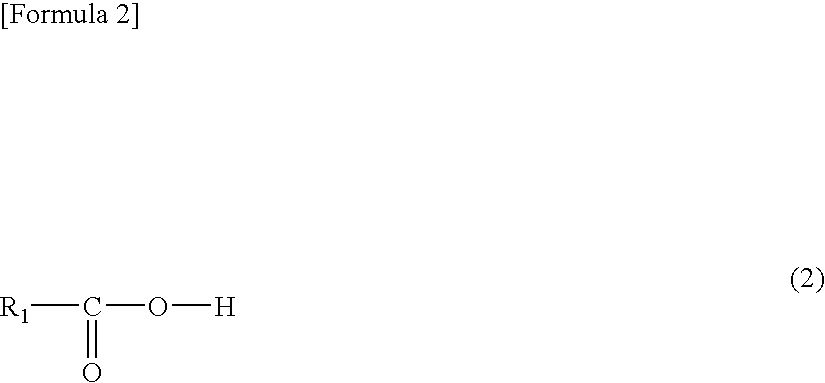Positive photosensitive resin composition
a technology of resin composition and positive lithography, applied in the direction of photosensitive materials, instruments, photomechanical devices, etc., can solve the problems of low sensitivity, achieve excellent positive lithography performance, high sensitivity, and achieve the effect of positive lithography performan
- Summary
- Abstract
- Description
- Claims
- Application Information
AI Technical Summary
Benefits of technology
Problems solved by technology
Method used
Image
Examples
reference example 1
[0112]In a 2-litter separable flask were mixed and stirred 197.8 g (0.54 mole) of 2,2-bis(3-amino-4-hydroxyphenyl)-hexafluoropropane, 75.9 g (0.96 mole) of pyridine and 692 g of DMAc at room temperature (25° C.) for dissolution. To the resultant solution was dropwise added, through a dropping funnel, 19.7 g (0.12 mole) of 5-norbornene-2,3-dicarboxylic anhydride separately dissolved in 88 g of DMDG. The time required for the dropwise addition was 40 minutes, and the reaction solution temperature was up to 28° C.
[0113]After the end of dropwise addition, the reaction solution was warmed to 50° C. in a hot water bath and stirred for 18 hours, followed by measuring the IR spectrum of the reaction solution to identify the appearance of the characteristic absorptions of imide group at 1,385 cm−1 and 1,772 cm−1.
[0114]Subsequently, the reaction solution was cooled to 8° C. in a water bath, and thereto was dropwise added, through a dropping funnel, 142.3 g (0.48 mole) of 4,4′-diphenylether di...
reference example 2
[0119]In a 1-litter separable flask were placed 109.9 g (0.3 mole) of 2,2-bis(3-amino-4-hydroxyphenyl)-hexafluoropropane, 330 g of tetrahydrofuran (hereinafter also referred to as “THF”) and 47.5 g (0.6 mole) of pyridine, and 98.5 g (0.6 mole) of 5-norbornene-2,3-dicarboxylic anhydride was added thereto, at room temperature, in the form of powder as it was. A stirring reaction was then conducted at room temperature in the above state for 3 days before identifying the reaction by HPLC, resulting in detecting a product with a purity of 99% as a single peak without detecting any raw material. This reaction solution was directly added dropwise to 1 L of ion exchanged water under stirring before filtering off the precipitate, and 500 mL of THF was then added thereto with stirring to dissolve it. The resultant homogeneous solution was passed through a glass column packed with 100 g of Amberlyst 15, a cation exchange resin (from Organo Co., Ltd.), to remove the remaining pyridine. Subseque...
PUM
| Property | Measurement | Unit |
|---|---|---|
| tensile elongation | aaaaa | aaaaa |
| temperature | aaaaa | aaaaa |
| temperature | aaaaa | aaaaa |
Abstract
Description
Claims
Application Information
 Login to View More
Login to View More - R&D
- Intellectual Property
- Life Sciences
- Materials
- Tech Scout
- Unparalleled Data Quality
- Higher Quality Content
- 60% Fewer Hallucinations
Browse by: Latest US Patents, China's latest patents, Technical Efficacy Thesaurus, Application Domain, Technology Topic, Popular Technical Reports.
© 2025 PatSnap. All rights reserved.Legal|Privacy policy|Modern Slavery Act Transparency Statement|Sitemap|About US| Contact US: help@patsnap.com



